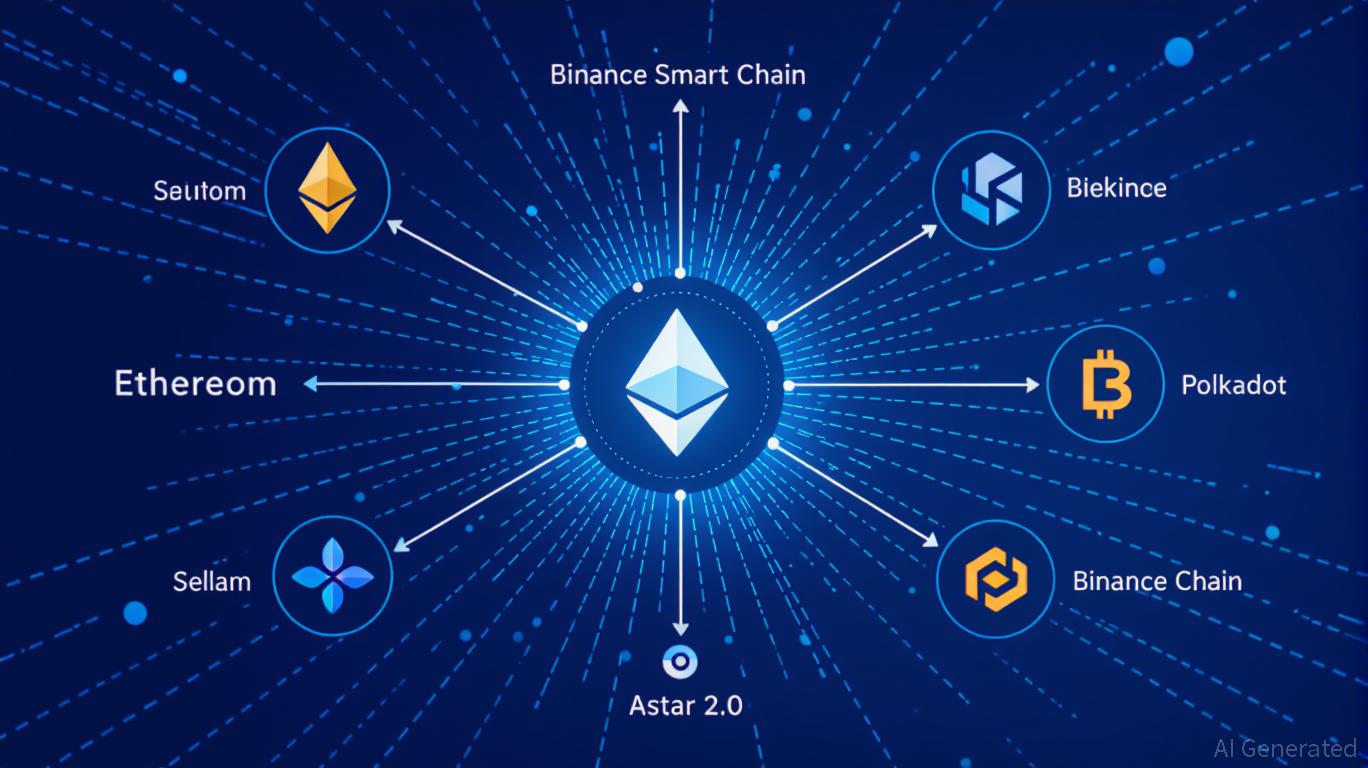Astar 2.0: Leading a New Generation of DeFi and Cross-Chain Advancements
- Astar 2.0 introduces a zkEVM mainnet and cross-chain interoperability, slashing gas fees and enabling 150,000 TPS with 2025 scalability goals. - Strategic partnerships with Mazda, Japan Airlines, and Sony demonstrate blockchain's real-world applications in logistics, loyalty programs, and digital asset tokenization. - Q3 2025 data shows $2.38M DeFi TVL growth and 20% active wallet increase, alongside a $3.16M institutional ASTR token acquisition. - The platform aims to solidify its role as a foundational
Technical Breakthroughs: zkEVM and Cross-Chain Scalability
The launch of a zero-knowledge Ethereum Virtual Machine (zkEVM) mainnet by Astar 2.0 represents a major evolution in DeFi infrastructure. Utilizing zero-knowledge proofs and rollup technology, the platform has significantly reduced gas costs and increased transaction throughput, making Ethereum-based services more accessible to both individual and institutional users
Astar’s capabilities in cross-chain operations further enhance its disruptive edge. The platform’s Astar Link framework incorporates protocols such as
Real-World Applications: From Automotive to Aviation
Astar 2.0’s collaborations with Japanese corporations showcase its ability to deliver real-world blockchain solutions. Mazda, for instance, is utilizing Astar’s hybrid blockchain to streamline supply chain management, using blockchain to monitor parts and minimize inefficiencies
Sony’s alliance with Astar further demonstrates this direction. By issuing digital assets on Astar’s network, Sony is opening up new monetization channels for creators and fans, aligning with the rising interest in NFT-driven platforms
Investor Implications: A Platform Poised for Growth
Astar’s technological progress and strategic moves are already yielding tangible results. In the third quarter of 2025, the platform’s DeFi total value locked (TVL) hit $2.38 million, outperforming the general downturn in the DeFi market

Challenges and the Road Ahead
Although Astar has gained significant traction, it still faces competition from ZK-rollup solutions and established Layer 2 networks. Nevertheless, its emphasis on security, regulatory compliance, and enterprise-level scalability—along with partnerships in sectors like logistics, aviation, and entertainment—gives it a distinctive advantage. Upcoming developments, such as the implementation of Coretime on Polkadot and Async Backing, are set to further decrease latency and enhance resource management,
Conclusion
Astar 2.0’s targeted upgrades and integration into real-world industries are transforming the DeFi and cross-chain environment. By solving issues related to scalability, interoperability, and institutional participation, the platform is not only overcoming technical barriers but also demonstrating blockchain’s practical value in traditional sectors. For investors, Astar stands out as a promising opportunity in a market with significant growth potential.
Disclaimer: The content of this article solely reflects the author's opinion and does not represent the platform in any capacity. This article is not intended to serve as a reference for making investment decisions.
You may also like
Bitcoin News Today: Bitcoin Evolves from Digital Gold to a Powerhouse for DeFi and AI
- Bitcoin's ecosystem shifts as DeFi adoption grows and miners pivot to AI/HPC, redefining its role beyond "digital gold." - Wrapped Bitcoin (WBTC) expands to Hedera , enabling BTC-based lending/trading via DeFi protocols, with Binance endorsing "BTCFi." - Bitfarms transitions from Bitcoin mining to GPU-as-a-Service, citing higher profitability amid rising energy costs and regulatory risks. - BitFuFu reports 100% YoY revenue growth ($180.7M) driven by cloud mining demand, as Bitcoin's price surge boosts in

Bitcoin Updates: Growing Bitcoin Acceptance and Robotics Funding Highlight Cryptocurrency’s Practical Progress
- Steak 'n Shake expands Bitcoin acceptance globally, citing 11% sales growth post-integration and symbolic support for El Salvador's BTC adoption. - Tether plans $1B investment in German robotics firm Neura, reflecting crypto capital's growing intersection with AI-driven physical-world innovation. - Bitcoin maximalist backlash forced Steak 'n Shake to reaffirm BTC-only payments, highlighting crypto community's influence on corporate strategy. - Strategic moves by fast-food chains and stablecoins signal cr

Affordability Initiatives Challenge the Trade-Off Between Immediate Remedies and Sustainable Strategies
- Rising affordability demands drive policymakers and businesses to implement targeted price controls, supply-side reforms, and expanded cost-reduction programs across sectors. - Paysign Inc. reports $21.6M Q3 revenue surge from patient affordability programs, scaling infrastructure to meet surging demand for healthcare cost solutions. - Wayvia's AI-powered Retail Intelligence platform automates pricing enforcement, aligning with Stanford's call for temporary price controls through data-driven mechanisms.

Dogecoin News Update: Crypto ETFs Indicate Widespread Adoption as XRP Launch Breaks $58M Trading Volume Record
- Canary Capital's XRPC ETF shattered records with $58M in day-one trading, outperforming Bitwise's Solana ETF . - SEC's regulatory clarity accelerated crypto ETF launches, enabling XRPC's Nasdaq listing and spurring XRP/DOGE ETF proposals. - Dogecoin's DOJE ETF generated $17M in September, reflecting growing demand for meme-coin exposure despite hybrid structure. - XRP price dipped 3% but ETF outperformed 2024 launches, highlighting crypto's shift from speculative bets to mainstream assets. - Mixed crypto
